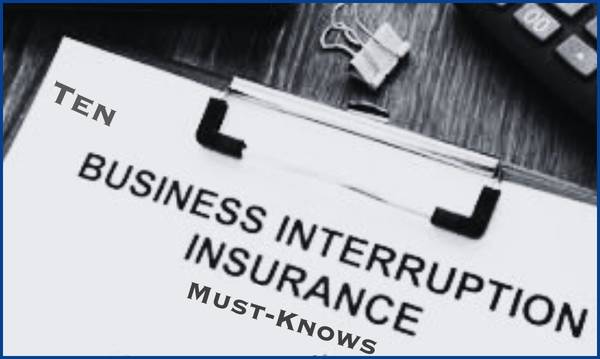

Ten Business Interruption Insurance Must-Knows
Introduction
Business Interruption Insurance (or simply Business Interruption) is more than an optional coverage; it can keep your head above water, help your business run smoothly, and answer many important questions in a crisis. Whether it’s a fire, an unexpected natural disaster, or any situation that leads to a business shutdown, this insurance allows your company to sail smoothly by offsetting the revenue loss during the period when business operations are halted. This article will uncover the ten business interruption insurance basics that every entrepreneur should know to protect their future. This guide is rich with insight, aptly answers many important questions, and brings forward many details that are usually ignored. Make sure to stick around because these pointers might just help you save the business one day.
Ten Best Home Insurance Companies Can Trust
Ten Business Interruption Insurance Must-Knows
i. What is business interruption insurance?
Business income insurance, or business interruption insurance, refers to the loss of income a business suffers when it cannot operate for a specific period due to a covered reason. Unlike property insurance, which pays for physical damage, this coverage helps maintain your cash flow and meet financial obligations like payroll, rent, and loan payments during downtime.
Similar Terms:
Business protection income
Revenue loss insurance
Catastrophic recovery insurance
ii. What Causes Coverage to Kick In?
There are important covered events such as
Natural catastrophes, e.g., hurricanes and earthquakes
Fires and explosion-related incidents
Malicious damage and theft
Business Interruption of utility services (sometimes with certain endorsements)
However, not every situation is covered. For example, government-mandated lockdowns or pandemics would only be covered if they are stated within the policy context.
Tip: Go through the perils that are named on your policy.
iii. Know the Waiting Period Clause
Policies tend to have a waiting period of 48 to 72 hours before coverage starts. If you're not aware, this delay could be devastating to your finances. Businesses, for example, have the wrong impression that coverage is immediate. Don't assume such things.
devastate
The most complete plans always have limits. Coverage usually includes:
Net income loss
Routine business costs
Relocation expenses
New equipment training expenses
However, this will not cover undocumented income and losses due to slow customer inflow after the business reopens. Could you discuss reasonable caps and exclusions with your insurer?
v. Coverage for extra expenses is often ignored
During emergency operations, this addition to your policy is a game-changer. It covers costs that exceed normal operational expenses during recovery, such as renting a temporary office, expedited shipping, or leasing replacement equipment.
vi. Duration of Coverage: The Restoration Period
The restoration period defines when the policy benefits will be paid, commencing after the waiting period and usually concluding upon completion of repairs. Some insurers have a 12-month maximum cap on this period.
Tip: Check with your provider for additional long recovery time extension restoration coverage limits.
vii. Claim Smoothly by Documenting Everything
The faster you work, the better. Making sure you have each of these prepared in advance will save you time in the long run:
- Up-to-date financial documents.
- Photos or videos depicting the damage.
- Associated costs documentation.
- Receipts for other incurred expenses.
- Records detailing communications with contractors/emergency services.
Having documented evidence greatly expedites the claim process.
viii. Customization Based On The Business Type
Each industry faces a range of business interruption risks. A restaurant and a tech entity will have vastly different needs. So, could you add ventilation and heating requirements for your industry?
You can consult with a niche-specific insurance broker tailored to your industry.
ix. Assess Your Business Interruption Risk Every Year
Your business's growth leads to increased risks and financial obligations. An annual audit of your small business’s insurance policies ensures you are not underinsured. Make sure also to add
New revenue-generating locations
Increased revenue streams
Greater variety of services or inventory
Not updating your policy may lead to claims being denied or payouts less than expected.
x. Relying on General Business Insurance Is Not Advisable
Several business owners make the mistake of assuming business interruption coverage is part of their standard commercial insurance policy. More often than not, it is placed in a rider or add-on. Read your policies and do not hesitate to ask for an itemized statement of the policy.
Ten Best Public Liability Insurance Companies for Protection
Conclusion
Managing your business is no easy task, so the last thing you want is a disaster to sever everything you’ve worked for. Incorporating these tips from the ‘Ten Business Interruption Insurance Must-Knows’ will help you make informed decisions about safeguarding your profit and ensure you’re able to recover faster from unfortunate events. This isn’t about whether something unpredictable happens, but when it does.
Common Misconceptions Clarified
“Insurance Covers All Types of Income Loss”
Incorrect. As stated earlier, the only lost or covered income is income that can be directly tied to the covered event. If your sales plummet due to bad public relations or from an economic recession, your insurer will not be able to cover that financial burden.
“Coverage Is Not Needed For Remote Businesses”
Even online businesses can experience service interruptions, outages from other data centers, or cyberattacks. Always assess your exposure to digital risks.
A Case Study: Hypothetical Illustration of an Event in the ‘Real World’
Consider a retail shop that gets hit by a hurricane. The shop is completely shut down for six months (losing income). With business interruption insurance coverage:
- Rent is paid
- Employees are kept
- A temporary website/store is maintained online
Without coverage? The owner may go bankrupt. A simple policy changes everything.
How to Choose the Right Policy
Could you collaborate with a professional?
A business insurance professional will assist you to:
- Identify policies that are not easy to detect. Income coverage is needed.
- Recommend useful add-ons such as cyber disruption coverage or civil authority coverage.
Look for More than One Provider
Look for at least three quotes. Try to add some competition. Don’t just focus on the premiums; look at the claim settlement history, customer service, and overall program adaptability.




